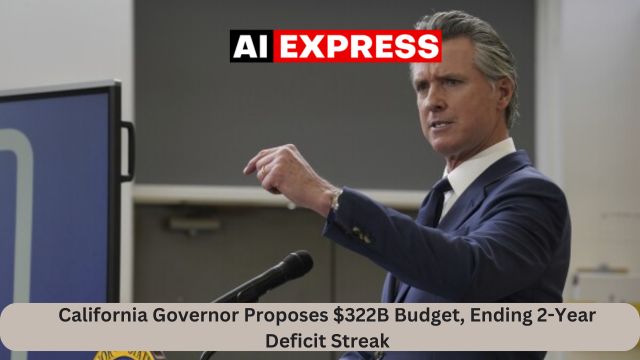Turlock, California (Aiexpress) – California Gov. Gavin Newsom has proposed a $322 billion budget with no deficit, a welcome change following two years of substantial budget shortages in the country’s most populous state.
However, the budget unveiled by Newsom on Monday is largely a placeholder as California waits to see if incoming President Donald Trump will follow through on vows to remove billions of dollars in federal funding, which could compel lawmakers to make harsh cuts to important services. The federal government funds over one-third of California’s budget, including tens of billions of dollars for health care services. Trump will take office on January 20, and Newsom must approve the final budget before the end of June.
California lawmakers have already called a special session to explore providing Attorney General Rob Bonta’s office an additional $25 million to defend against or face potential legal challenges from the Trump administration. California and Washington, D.C. are likely to clash over climate policy and immigration rights. State senators have also recommended more funds to give free legal services to immigrant communities.
Finding a means to balance the budget in the face of probable federal funding cuts will be a key test for Newsom, who is in the final two years of his final term and is still regarded as a future presidential candidate.
One project that could be jeopardized is the state’s high-speed rail project, which would eventually transport passengers between Los Angeles and San Francisco but is significantly underfunded and behind schedule. Trump canceled roughly $1 billion in federal financing during his first term in 2019, and numerous Republican members of Congress are already criticizing the project for its high price. President Joe Biden later restored the government funds allocated to it.
Perhaps anticipating a struggle, Newsom drove to a project construction site on Monday to highlight progress, including getting all necessary environmental permits.
“This is not only a transportation project. “This is a transformation project,” Newsom explained. “To the cynics that are filled with cynicism, that stand on the sidelines and don’t engage, we’re here making this work.”
On the budget, Newsom provided few details about anticipated expenditure but boasted of progress on sectors where the state has received criticism, such as investment in education and infrastructure and efforts to address the homelessness epidemic. Despite the uncertainty, the Democratic governor expressed optimism about the state’s future.
“We’re also walking into headwinds, a radically different moment in U.S. history,” according to him. “We need to be prepared.”
Newsom’s office intends to share additional information about the budget proposal before Friday’s deadline to deliver it to lawmakers. Newsom made the announcement before leaving for former President Jimmy Carter’s burial.
Newsom stated that he is proposing little new investment, but the budget does allow the state to fully execute the country’s first universal transitional kindergarten program, which would make such education free for almost 400,000 4-year-olds in California. That is a project that Newsom has supported since 2021. His plan also involves boosting the state’s film and television tax credit to $750 million per year in order to reintroduce Hollywood jobs that have previously been relocated to New York or Georgia.
He claimed that prudent budget planning in the previous year prevented the state from facing a significant shortage this year.
“Last year, we endeavored to make this year’s budget a nonevent,” he told me.
The governor’s office also predicts that tax collections would be $16.5 billion higher than expected this year, owing to a surging stock market and significant income growth among California’s upper-income residents.
That has helped the state weather the slow economy, which has seen minimal job growth and persistently low consumer spending.
California’s economy is the fifth largest in the world. Last year, the state’s budget deficit was anticipated to be $46.8 billion, up from $32 billion the previous year. According to Newsom, the state saved $1.2 billion over two years by eliminating over 6,500 vacant positions in state departments, as well as an additional $3.5 billion by lowering travel expenses and updating IT systems.
However, such deficits have prompted the state to scale down or postpone several of its progressive measures, which were propelled by record-breaking surpluses during the COVID-19 pandemic.
Unlike most states, California taxes capital gains, which are mostly earned from investments and stocks, at the same rate as earnings and salaries. As a result, only 1% of the population accounts for roughly half of the state’s income tax revenue. This has resulted in big, unpredictable revenue swings in California’s budget.
Republican state Sen. Roger Niello, who serves on the budget committee, said the governor did not present a plan to assist address future budget deficits. In November, the nonpartisan Legislative Analyst’s Office cautioned that the state could face double-digit shortages in the coming years.
“We’re looking at $20 to $30 billion deficits, and unless we start doing something to address that now, it’s going to become very difficult,” Niello said during a phone conversation.
Newsom said Monday that he supports attempts to increase the state’s rainy day fund, but admits it will be a “herculean effort.”













Leave a Reply